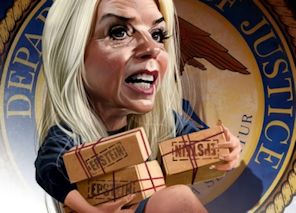 A growing number of federal judges are expressing frustration with the Department of Justice (DOJ) under Attorney General Pam Bondi, citing repeated incidents in which government lawyers have been accused of misleading the courts or ignoring judicial orders.
A growing number of federal judges are expressing frustration with the Department of Justice (DOJ) under Attorney General Pam Bondi, citing repeated incidents in which government lawyers have been accused of misleading the courts or ignoring judicial orders.
By Robert Alexander
The concerns have intensified following a whistleblower’s account aired on 60 Minutes and a comprehensive review of federal cases by legal scholars.
Why It Matters
The growing conflict between federal judges and Bondi’s Justice Department goes beyond one whistleblower’s account. It strikes at the core of the rule of law—whether courts can still rely on the government’s word.
Allegations that department lawyers misled judges, ignored orders, and punished internal dissent have prompted rulings from both Republican- and Democratic-appointed judges questioning the government’s honesty in court.
If the Justice Department loses its hard-earned presumption of good faith, the damage could outlast any administration and weaken the integrity of the nation’s judicial system itself.
What To Know
Whistleblower Alleges Retaliation Over Deportation Case
Erez Reuveni, a former senior Justice Department attorney who specialized in immigration law, told 60 Minutes that he was fired after refusing to sign a brief he said contained false claims in the wrongful deportation case of Kilmar Abrego Garcia.
“I took an oath to uphold and defend the Constitution,” Reuveni said. “My view of that oath is that I need to speak up and draw attention to what has happened to the department, what is happening to the rule of law. I would not be faithfully abiding by my oath if I stayed silent right now.”
Reuveni, who served the department for 15 years across multiple administrations, described an internal culture that increasingly disregarded judicial authority.
Allegations of Instructions to Ignore Court Orders
The former DOJ attorney recounted a March meeting at which senior Justice Department official Emil Bove allegedly told attorneys that planes deporting Venezuelan detainees should depart “no matter what,” even if a court ordered otherwise.
“Then after a pause,” Reuveni said, “he also told all in attendance, and if some court should issue an order preventing that, we may have to consider telling that court, ‘F*** you.’ ”
The remark, which Bove has denied, stunned Reuveni. “Here is the number-three official using expletives to tell career attorneys that we might just have to consider disregarding federal court orders,” he said.
When detainees’ lawyers challenged the deportations, U.S. District Judge James Boasberg convened an emergency hearing and asked a government attorney whether the planes were leaving that weekend.
The attorney said he did not know, though Reuveni said everyone at the meeting had been told the flights would proceed. “It is the highest, most egregious violation of a lawyer’s code of ethics to mislead a court with intent,” Reuveni told 60 Minutes.
The deportations continued while the hearing was underway.
Peter Keisler, who served as acting attorney general under President George W. Bush, told 60 Minutes that the Justice Department is bound to obey court orders even when it disagrees.
“We have a saying in this country,” he said. “Everybody deserves their day in court. All of us want to know that if the government acts against us, we will at least have the opportunity to go to a neutral decision-maker and make sure that the government stays within its legal bounds.”
Reuveni’s refusal to label Abrego Garcia a terrorist led to his dismissal.
In June he filed a whistleblower complaint with the Government Accountability Project.
The Justice Department, Bondi, and Bove declined 60 Minutes’ interview requests.
In a later confirmation hearing for a federal judgeship, Bove said he had “never advised a Justice Department attorney to violate a court order” and described Reuveni’s claims as “a mix of falsehoods and wild distortions of reality.”
Wider Pattern of Misleading Courts, Scholars Warn
Legal scholars say the issues extend well beyond one case. Ryan Goodman, a professor at New York University School of Law and founding editor of the nonpartisan site Just Security, told 60 Minutes his team reviewed hundreds of court rulings involving President Donald Trump's administration.
“We found over 35 cases in which the judges have specifically said what the government is providing is false information. It might be intentionally false information, including false sworn declarations time and again,” Goodman said.
His study documents repeated judicial findings that government lawyers disregarded court rulings or failed to comply with orders, prompting some judges to question the traditional “presumption of regularity” accorded to executive actions.
Recent rulings have echoed that concern. Judges of both parties have criticized the department’s conduct, with one warning that “trust that had been earned over generations has been lost in weeks.”
Bondi’s department has not issued public statements addressing the pattern of judicial rebukes.
The Supreme Court ruled unanimously this spring that everyone deported under the administration’s use of the Alien Enemies Act is entitled to due process—a decision underscoring the principle that even in national-security matters, government actions must remain subject to judicial review.
As Goodman observed, “The one entity, or person, or institution that gets hurt the most is the Justice Department.”
What People Are Saying
Judge Paula Xinis, at a July 11, 2025, hearing in Abrego Garcia vs. Noem said: “You have taken the presumption of regularity and you’ve destroyed it, in my view.”
Judge Amy Berman Jackson, preliminary injunction order in National Treasury Employees Union vs. Vought, March 28, 2025, said: “The court is left with little confidence that the defense can be trusted to tell the truth about anything.”
Chief Judge James E. Boasberg, memorandum opinion regarding Venezuelan deportations, April 16, 2025, said: “There is probable cause that defendants willfully disobeyed a binding judicial decree.”
What Happens Next
The next phase of the controversy surrounding the DOJ will hinge on accountability and trust. Reuveni’s whistleblower complaint is expected to prompt investigations by oversight bodies and possibly the DOJ inspector general, while federal judges may tighten scrutiny of government filings and enforce sanctions for misconduct.
Congress could hold hearings to examine whether senior officials disregarded judicial directives or retaliated against career lawyers. For Bondi, the challenge now is restoring credibility with the judiciary and reaffirming the department’s duty of candor.
Even if no wrongdoing is proven, the erosion of judicial trust could have lasting effects on how courts treat the government’s word in future cases.



























